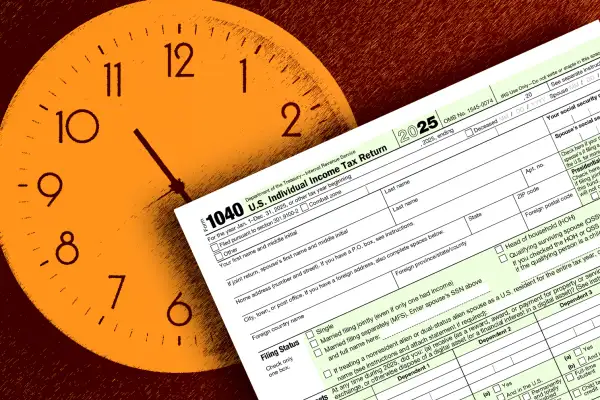When Can You Start Filing Taxes?

It might still be winter, but just like those April showers, Tax Day will be here before you know it.
While it's tempting to put off filing your taxes until the last minute, it's smart not to procrastinate. If you run out of time and file your taxes late, you can expect to get hit with penalties and, if you owe taxes, interest payments on top of the money you already owe. (Getting an extension on your taxes just gives you more time to file your return. You still have to pay what you owe by April 15.)
You can avoid all that hassle and expense by filing your taxes early; in fact, you could file your taxes today if you wanted. The IRS is already accepting 2025 tax returns. Here's what you need to know.
When can you start filing federal tax returns?
Not the type to wait until the last minute? First of all, good for you! Procrastinating over your taxes is a recipe for a headache. Plus, if you're owed a refund, the sooner you file, the more quickly you can get your money, assuming there are no complications processing your return.
The calendar date for when tax-filing season begins each year varies, but the IRS usually sets it right around the end of January or the beginning of February (kind of like the Super Bowl).
Tax Day is always either on or very close to April 15, a date that gets moved only to accommodate weekends and holidays. This year is no exception; Tax Day 2026 is April 15.
However, the date the IRS chooses to begin each year's filing season depends on a number of factors, including changes in tax law and the agency's overall readiness.
Bonus money: Deposit funds into a new SoFi Invest Account to earn up to $1,000 in stock.
This year, the IRS announced it would begin accepting 2025 tax returns on Jan. 26, meaning we're already into this year's filing season. (If you filed with a tax prep service or accountant before then, they just held your return until the filing season opened).
Although taxpayers had the option last year of using the IRS's free Direct File tool for filing simple returns, the agency confirmed in November that it was terminating the program. The news followed months of speculation that it was on the chopping block, even though more than 140,000 taxpayers used it in 2024.
Direct File is different from Free File, a longstanding partnership the IRS has with major tax-prep software firms that is still available to individuals and families with adjusted gross incomes of $84,000 or less.
Whether you use Free File or another platform to file your taxes, you need to gather the relevant documents beforehand. This includes your W-2 if you earn wages or a salary, and 1099s if you earn income from other sources such as freelance work or interest on a bank account balance.
If you don't have a bank account, opening one soon should also be on your to-do list. The IRS announced last fall that, with a few limited exceptions, it is eliminating paper refund checks.
Roughly 93% of refunds are already sent out as direct deposits, which the agency says allows it to distribute refunds faster and more cheaply. But if you're one of the remaining 7% still opting for old-school methods, creating an account at a bank or credit union will help ensure that you can get your refund in a timely manner.
When can you start filing state taxes?
Although state income taxes aren't handled by the IRS, most state tax-collecting agencies follow the same calendar as their federal counterpart.
While most states' tax calendars mirror the IRS's, there are outliers: Hawaii and Oklahoma, for instance, give you until April 20. (In Oklahoma, you need to file electronically to get that extra five days). Delaware, Iowa and New Mexico (for electronic filers) have deadlines of April 30. South Carolina (if you're filing electronically) and Virginia have May 1 deadlines, and nine states don't levy an income tax at all.
Save smarter: Take control of your money with the Rocket Money budgeting app.
Why file your taxes early?
Most people aren't waiting eagerly to file their taxes as soon as possible, but filing early — especially if you have a more complex return — is a smart move.
For starters, if you're expecting a refund, filing sooner typically means getting that money sooner. (And if you owe taxes due, at least you'll have a couple months to fit that payment into your budget.) Filing your taxes early also means you're less likely to be the victim of an identity theft scam where a criminal impersonates you in order to steal your refund. While the IRS and states have been cracking down on the practice, it's still a risk.
Waiting until the last minute means you'll probably have a lot of company. With most people filing online these days, the era of long lines at the post office to have taxes postmarked by the deadline is over. But if you have to contact the IRS or need any kind of assistance filing your taxes, you could find yourself in a very long virtual queue if you put it off. Filing early means you're less likely to encounter lengthy delays on customer-service lines or overloaded websites.
For 2026, this conventional wisdom is even more true than usual: A combination of major tax changes introduced by the One Big Beautiful Bill Act and downsizing of 20,000 IRS workers could lead to delays in processing returns and longer wait times for customer service, the agency warned in a memo earlier this year. Especially if you have a complicated tax situation or expect to need assistance, you'll want to beat the rush.
Also, if you pay for tax-prep assistance, waiting to file could actually cost you more: It's become a common tactic for big tax prep companies to adjust (read: increase) prices for their services the closer we get to April 15.
More from Money:
Trump's Tax Cuts Will Change How Millions of Americans File in 2026: Are You One of Them?
Here Are the Federal Income Tax Brackets for This Year
From New Deductions to Bigger Refunds, Here Are 8 Major Tax Changes in 2026




